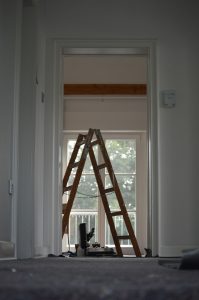A fixer-upper sounds like a good idea, but think before you buy.
Recently, my boyfriend of six years and I discussed the possibility of purchasing a fixer-upper in an effort to grow our financial portfolio and begin creating our own home after renting an apartment for the last three years together. It seemed like a great idea, and we even considered renting the house out when we would ultimately choose to move. However, after speaking with his father, who is in the banking business, we decided against it for more reasons than one.
Here is what we were advised and what you should consider, too, prior to diving in to this renovation project:
- Before beginning any new investment, you should always do your research first and foremost. When buying a home, whether choosing one that needs restored or not, look at an inspection report. Along with this visual report, you will want to know the home’s full history and study its neighborhood. A house in a historic district, for example, will most likely have a higher value but may also require more costs due to rebuilding with accurate components. Moreover, you will want to assess the district to see its demand, crime rates and more as those notes are necessary to see how easy it’d be to resell or what would add profit to the property. Your neighborhood (and home) should have room to grow for an ideal situation.
- What’s your budget? What would you hope to make back on the home, and is it possible to do so following your updates? Are any electrical upgrades required? Is there any concern of lead-based paint or asbestos? If so, what may have originally would have been a small investment may rack up the costs. These are all important questions to ask. Your finances should include the cost of the home, construction and the unexpected.
- Are there any restorations you can do on your own? And not just that, but do you have the time to do them? Know and be realistic with your skills and availability to work on this project. Stripping wallpaper and painting is one thing; upgrading your sewer system is another.
- Before you even make an offer on any house, make sure to price the expenses of repairs and remodeling, including cost of labor.
- Have an idea of what changes you would want to make to the home. Get some direction from the inspector and another professional to prevent your project from turning into a total disaster. You also want to determine if the home is worth the investment. You don’t want to make unnecessary updates, such as tearing up original woodwork that could actually add value to the home, or buy a complete dud that really can’t be restored.
If you are considering taking this leap, just be sure to take all avenues into review. As I mentioned before, weigh out all the costs to figure out how much you should pay. This can be concluded through the renovation expenses of the property based on the housing report and all materials needed deducted from the home’s probable market value after the updates, using the area’s real estate prices. You should additionally subtract up to 10 percent for those unforeseen extra costs we were talking about earlier, as is expected with any new home purchase. What is left over should be your offer on the house.
By consulting with a few professionals, you should be led into the right direction and one step closer to home sweet home. Maybe one day we will end up getting that fixer-upper, but for now, my beau and I are content where we are.
Have you bought a fixer-upper? What were your results? What would you add to this list?
Jenn Clark is a writer, PR specialist, entrepreneur, blogger and coffee enthusiast. A lover of laughter, traveling and cheese, she’s written about her life experiences here at suburbanfinance while at the same time growing other young professionals. You can find more of her work at Jennblogs.co.

